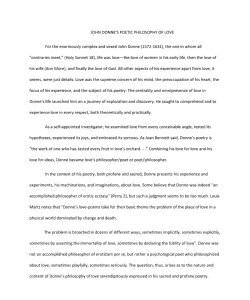JOHN DONNE'S POETIC PHILOSOPHY OF LOVE For the enormously complex and vexed John Donne (1572-1631), the one in whom all “contraries meet,” (Holy Sonnet 18), life was love—the love of women in his ear
JOHN DONNE'S POETIC PHILOSOPHY OF LOVE For the enormously complex and vexed John Donne (1572-1631), the one in whom all “contraries meet,” (Holy Sonnet 18), life was love—the love of women in his ear
JOHN DONNE'S POETIC PHILOSOPHY OF LOVE
For the enormously complex and vexed John Donne (1572-1631), the one in whom all “contraries meet,” (Holy Sonnet 18), life was love—the love of women in his early life, then the love of his wife (Ann More), and finally the love of God. All other aspects of his experience apart from love, it seems, were just details. Love was the supreme concern of his mind, the preoccupation of his heart, the focus of his experience, and the subject of his poetry. The centrality and omnipresence of love in Donne’s life launched him on a journey of exploration and discovery. He sought to comprehend and to experience love in every respect, both theoretically and practically.
As a self-appointed investigator, he examined love from every conceivable angle, tested its hypotheses, experienced its joys, and embraced its sorrows. As Joan Bennett said, Donne’s poetry
